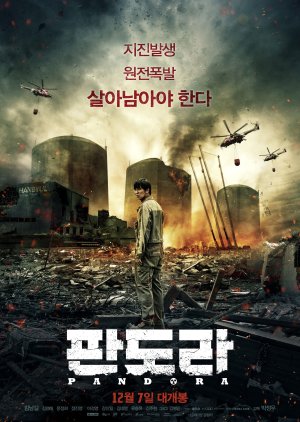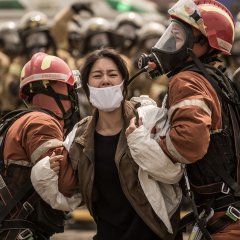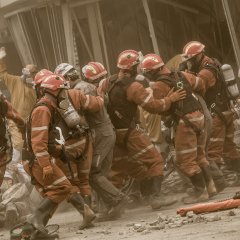 Yoon Hyun Soo confirmed to be part of "Parasite" writer's directorial debut project!
Yoon Hyun Soo confirmed to be part of "Parasite" writer's directorial debut project! A nuclear power plant is built in a peaceful small town in South Korea. All residents praise the nuclear power station for bringing new jobs and life to the quiet town except Jae Hyuk who lost his father and a brother due to a coolant exposure accident while working on the nuclear power plant. But now, he is forced to work in the station against his will. The nuclear power plant gradually corrodes, and one day, with an unexpected earthquake, old pipes in the nuclear power plant break and hydrogen gas explode. To stop the atomic explosion, Jae Hyuk goes into the nuclear power plant to save his beloved people. Will he save the ones he loves from the disaster? Will he come back alive? (Source: KoBiz) Edit Translation
- English
- Arabic
- Türkçe
- Español
- Native Title: 판도라
- Also Known As:
- Screenwriter & Director: Park Jung Woo
- Genres: Thriller, Drama
Where to Watch Pandora
Cast & Credits
- Kim Nam GilJae HyeokMain Role
- Kim Joo HyunYeon JuMain Role
- Jung Jin Young Main Role
- Kim Young AeMrs. Seok [Jae Hyuk's mother]Main Role
- Moon Jung HeeJeong HyeMain Role
- Kim Dae MyungGil SeobMain Role
Reviews

A disaster movie, yet using emotional + vivid suggestive power in the tradition of anti-war-movies
"Pandora" is a disaster movie.I don't really consider myself a fan of this genre, which focuses on mass panic and adrenaline.
However, I consider this KMovie particularly valuable.
In this case I think the makers have succeeded in doing something similar to what anti-war movies try to achieve: deterrence by vividly conveying the threatening horror. In respect to the scenario of a nuclear catastrophe the movie applies emotional and vivid suggestive power, at the same time making people think and possibly question the sense and usefulness of highly dangerous nuclear power plants.
In view of the consecutive radical change of South Korea's nuclear policy six months after "Pandora" was released, one could say: the project was worth it. (It would probably be too daring to talk about causality, but it could be considered a noticeable correlation...)
The 2016 KMovie picks up on the 2011 Fukushima nuclear disaster and, against this background, develops a story that is comparable by South Korean standards. South Korea is the country with the highest population density in the immediate vicinity of its nuclear power plants. However, due to its insular position, a realistic evacuation plan in the event of a disaster is a major problem. With the movie "Pandora" the lid of the legendary box is shaken. In this case, a nuclear power plant on the East Coast suffers earthquake damage and radiation leaks, similar to Fukushima 5 years earlier. The film fictionally exercises the processes in the event of such a catastrophe (or a comparable one) and comes full circle with a deliberately touching scene in which Kim Nam-gil makes an emphatic plea against nuclear power in his usual impressively passionate way.
Regarding such critically oriented material, the production obviously had difficulties with its financing - in South Korea the lobby of the nuclear industry is as powerful as anywhere else. Nevertheless, the ambitious project could be realized through crowdfunding.
------------------------ SIDE NOTE: --- Sobering facts/outlook on nuclear power plants in South Korea ---
"Pandora" was released in December 2016.
In early summer 2017, as one of the existing South Korean nuclear reactors was actually scheduled to be shut down, President Moon Jae-in announced that the country's nuclear-focused energy policy would be stopped and that the country would instead steer towards a nuclear-free era. Accordingly, plans to build new reactors or extend the life of existing ones have been abandoned. A sign of hope?
However, by the autumn of the same year already, the government's political commitment was no longer valid. The nuclear lobby has actually been able to exert such pressure (the President's faction not having a majority in Parliament....) and prevail that new power plants were going to be built again.
South Korea's nuclear companies make a lot of money by exporting their self-developed reactors. The companies want reference projects in their own country... it is as simple as that...
As far as the people are concerned: According to a survey by the polling institute Realmeter in 2018, 61 percent of adult South Koreans still firmly support their president’s original nuclear phase-out course. Another 10 percent tend to do so. Yet, the lobby as so often has more to say...
... To date, South Korea covers a third of its electricity needs with 24 nuclear reactors.
... There are always earthquakes on the peninsula...
------------------------

The movies showed a lil bit of government's incapacity to react on national crisis due to politics and nation's image issues. And this fatal mistakes led to a bigger crisis and loss from their citizen. The pace was fast. We got straight to the main crisis on the first few minutes, but the writer still capable to maintain the depth of each character. There wasn't any flashback scene (almost), unlike the usual Korean Movie's with fast pace plot, but we still able to understand each character's idealism and initial heart.
Pandora showed a good, undisturbing, graphics. There wasn't any action and all the focus was to solve one big crisis in any way feasible. Surprisingly, with this thick and intense plot, Pandora wasn't boring at all. In fact, we were brought to a roller coaster of emotion, right from the very start. A mass production, with the purpose to remind that a big advantage has the same amount of risk within it. Entertaining, as well as educating (who knows that South Korea has 24 nuclear power plant in 9 southern cities?)
That's it the Pandora.
"Don't close your eyes because of fear. Don't cover your ears because of fears. We have opened the Pandora's Box. Although disaster were inside. Wasn't there also hope?"





















































